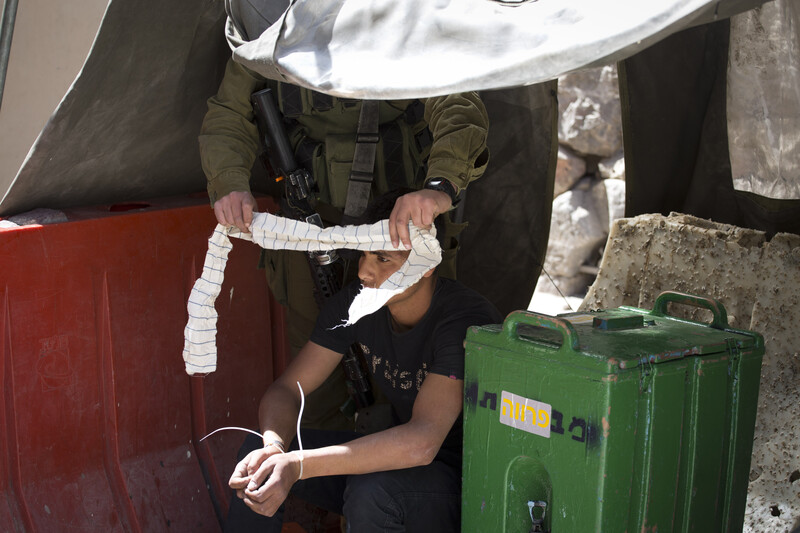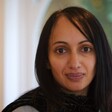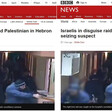Media Watch 17 June 2014

Israeli soldiers raid a Palestinian home in the town of Halhul, near the occupied West Bank city of Hebron, 16 June.
ActiveStillsIn the first ten days of June, seventeen teenage boys were abducted in the occupied West Bank. The youngest was thirteen, the oldest seventeen.
Some were dragged at gunpoint from their homes and family in the middle of the night; others were seized from the streets in broad daylight.
All of the abductions were documented by the Palestinian Monitoring Group. None were reported by the international media. No Western politicians called for the release of the boys.
On 12 June, three more teenage boys went missing in the West Bank. Their disappearance sparked worldwide media coverage, cries of terrorism and demands for their release by the US Secretary of State and the UK Foreign Secretary.
Those three are Israeli. The seventeen others are Palestinian.
And, if the case of Israeli soldier Gilad Shalit, taken by Palestinian forces in Gaza in 2006 and released in 2011, is any indication, Western interest in the case of these three Israelis will not wane until they are found.
Black hole
Conversely, the seventeen Palestinian boys seized by heavily armed Israeli soldiers will disappear into the same silent black hole as all the other Palestinian children taken on an almost daily basis by the occupation forces.
Some will be detained for days, weeks, or months, beaten, interrogated and then released. Others, however young, will find themselves put through Israel’s military courts and jailed, often on the basis of coerced confessions.
According to the rights group Addameer, there are currently approximately two hundred Palestinian children being held in Israeli jails. Some of those children will suffer periods in solitary confinement; all are at risk of physical abuse amounting to torture.
If their plight is anything to go by, the seventeen Palestinian youngsters taken by the Israeli army at the beginning of June will merit not a word spoken or written about them by the same journalists now eager to tell the world about the disappearance of three Israeli teenagers.
If children and teenagers disappear in the West Bank as a result of the occupation, it should be reported, whether those youngsters are Palestinian or Israeli. But, in the highly selective Western media reporting on Israel’s occupation, Israeli suffering always trumps that of Palestinians.
Since the disappearance of the three Israelis last week, the Palestinian town of Hebron has been held under siege by the Israeli army, up to 1,000 soldiers have been going door to door in towns and refugee camps across the West Bank searching and ransacking civilian homes, two hundred Palestinians have been taken into detention, a twenty-year-old Palestinian has been shot dead, and the Israeli government has been threatening the forcible transfer of some West Bank Palestinians to Gaza for supporting Hamas.
This is the degree of control that Israel exerts over Palestinian lives. But that control seems to be so accepted, or ignored, by Western media that there has been next to no comment on Israel’s actions, and the illegality of them, over the last five days. The sole focus is on the Israeli teenagers, with scarce journalistic attention left over for the collective punishment being meted out to thousands of Palestinians by a country which calls itself democratic.
No Palestinian mothers
The case illustrates starkly the difference in the attitude of Western media towards Israelis and Palestinians, an attitude exemplified by the BBC.
BBC news bulletins have carried regular updates on the missing Israelis, and backed them up with online stories. In one online article, headlined “Israel accuses Hamas of abducting missing teenagers,” an embedded video features the mother of one of the Israelis talking about her wish for his safe return.
While BBC audiences have been made well aware of his situation and that of his two friends, they remain in the dark about the Palestinian children and teenagers regularly abducted by Israeli soldiers.
BBC reporting also shields them from the frequency with which Palestinian children and youth are killed by Israeli forces.
There were no BBC reports on the killing of 14-year-old Yussef Shawamreh, shot in the back and hip while gathering thistles in March, or of 18-year-old Saji Darwish, shot in the head as he tended his goats that same month. The killing of seven-year-old Ali al-Awwar in an Israeli missile strike on Gaza last week also fails to warrant a report. There are no embedded video interviews with the mothers of Yussef, Saji or Ali, mourning the permanent loss of their sons.
In response to questioning by Palestine Solidarity Campaign about the failure to report on the killing of Palestinian children by Israeli forces, the BBC responded: “There is no mandate to report every killing.” Would BBC editors have felt the same way if seven-year-old and fourteen-year-old Israeli children had been killed by Palestinians?
Media’s cloak of silence
The last few days have highlighted the extremely narrow framework, not just of the BBC’s reporting on the occupation, but of the Western mainstream media as a whole.
More than 5,000 Palestinians are currently held in Israeli jails, where torture has been documented by organizations including Amnesty International. Approximately two hundred are incarcerated without ever having been charged or tried for a crime, for indefinite periods of time, under a system known as administrative detention, according to Addameer. And more than two hundred have been on hunger strike since April in protest of Israel’s use of administrative detention. The BBC’s response to the mass hunger strike, now in its second month, and Israel’s attempts to rush through legislation allowing force-feeding, has been silence.
The same silence cloaks house demolitions (15,000 Palestinian homes demolished by Israel since 1993), the destruction of entire communities, with Palestinian villages being bulldozed both in the West Bank and within present-day Israel, the killing of Palestinian children (1,405 killed by Israel since 2000), the denial of sufficient water for drinking, washing, cooking to Palestinians in both Gaza and the West Bank, and the true effects of the siege on Gaza which denies Palestinians everything from essential medicines to electricity.
The list goes on and on. How many consumers of mainstream news reports in the West know any of this? How many know that Israel’s apartheid wall in the West Bank is more than twice as high and four times as long as the Berlin Wall that we all in the West were taught to loathe? How many know that the Palestinians had their country seized from them in 1948, that Israel was created on that stolen land, and the total lack of justice or reparations since then, coupled with ongoing brutal military occupation, has led to this present situation?
The number will be as limited as the mainstream news reporting that keeps them in the dark. Their lack of knowledge will display in a total lack of understanding of Israel’s occupation and its devastating impact on every aspect of Palestinian life.
These are the audiences created by Western mainstream journalists, with the kind of selective reporting we’ve witnessed this week, audiences whose ignorance can only be to the detriment of Palestinians and to the benefit of Israel.






Comments
Benjamin Netanyahu
Permalink James Michie replied on
Benjamin Netanyahu is a megalomaniac--deranged and delusional!
"Justice"in Israel
Permalink Sabiha Saleem replied on
This blog by Amena Saleem must be published in ALL the western media,otherwise it will be very unjust practice.
"Justice" in Israel
Permalink dianab replied on
I agree completely. Amena Saleem's outstanding piece needs to be disseminated as widely as possible. Brava, Brava, Amena Saleem!! Wonderful writing and superb reporting!!!
How to reach this audince?
Permalink Hashim Sameer replied on
It is important to have TV programs, or at least Youtube programs, that show how regional and international media and organizations deal with Palestinians. It should be subtitled in Arabic, English, Hebrew and other languages.
Note: The link of the BBC response is directing to a local file.
3 Missing Settlers
Permalink Julie Webb-Pullman replied on
The UN quickly backed down, and admitted it had 'no concretee evidence' that an abduction had occurred following the publication of this article. http://gaza.scoop.ps/2014/06/3...